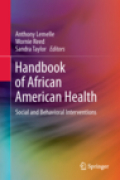
Handbook of African American health: social and behavioral interventions
Lemelle, Anthony
Reed, Wornie
Taylor, Sandra
The U.S. Census Bureau reports particular demographic, social, and health conditions for African Americans. Population-wide, the African American communityhas a higher mortality rate from cancer and diabetes than the rest of the population, a higher infant mortality rate, and a lower vaccination rate for influenza and pneumonia. The contributions to this comprehensive Handbook of African American Health uncover the specific demographic conditions of the African American population, and outline social interventions for both physical and mental health at the primary, secondary, and tertiary levels.The 26 contributions to this comprehensive volume cover interventions for a diverse range of health problems, including:. -obesity and cardiovascular disease. -diabetes. -asthma and other respiratory diseases. -smoking, alcohol, and recreational drug abuse. -risky sexual behaviors. -cancer screening, prevention, and survivorship.-infant mortality. -community and interpersonal violence. -mental health. From a healthcare standpoint, it also examines specific interventions for treatment compliance, health care access, and community collaborations. This volume will be an invaluable resource for researchers in medical sociology, mental health studies, public health, health behavior, and African American studies. Focuses on interventions and prevention rather than health outcomesUnique focus on African American health needs and demographic considerationsComprehensive coverage of societal causes and solutions for health problems as well as health care access INDICE: Section 1. Background of Social and Behavioral Health Disparities Interventions among African Americans: Conceptual, Operational, and Theoretical Overview of African American Health Related. Disparities for Social and Behavioral Interventions.-Ethics and Intervention Programming. Section 2. -Fundamental Intervention Needs.-Health, Nutrition, Access to Healthy Food and Well-Being among African Americans.-Promoting Physical Activity in Black Children andAdolescents: Intervention Strategies Health Practitioners have put into Play.Section 3. Major Lifestyle Intervention Considerations.-Reducing Tobacco Related Health Disparities: Using Mass Media Campaigns to Prevent Smoking and Increase Cessation in Underserved Populations. Section 4. Important Interventions for Children.-Interventions to Reduce Childhood Lead Poisoning. Contemporary Interventions to Prevent and Reduce Community Violence among African American Youth. Factor Structure and Expression of Depressive Symptoms in a Community Sample of African American Adolescents living in Urban Public Housing.-Rites of Passage: Cultural Paths for HIV/AIDS Prevention in African American Girls. Section 5. Urgent Interventions for Women.-Black-White Disparities in Birth Outcomes: Is Racism-Related Stress a Missing Piece of the Puzzle?.-African AmericanWomen and Breast Cancer: Interventions at Multiple Levels. Section 6. Critical Interventions for African American Men.-Prevention of Risky Sexual Behaviorsamong African American Men.-Post-Prison Community Re-entry and African American Males: Implications for Family Therapy and Health.-Beyond the myth: Addressing suicide among African American males.-Section 7.-Clinical Interventions for Healthy Communities.-Beyond the myth: Addressing suicide among African American males. Section 7. Clinical Interventions for Healthy Communities.-
- ISBN: 978-1-4419-9615-2
- Editorial: Springer New York
- Encuadernacion: Cartoné
- Páginas: 300
- Fecha Publicación: 08/05/2011
- Nº Volúmenes: 1
- Idioma: Inglés
